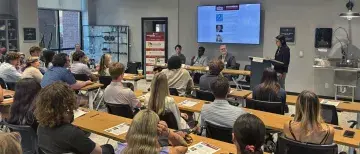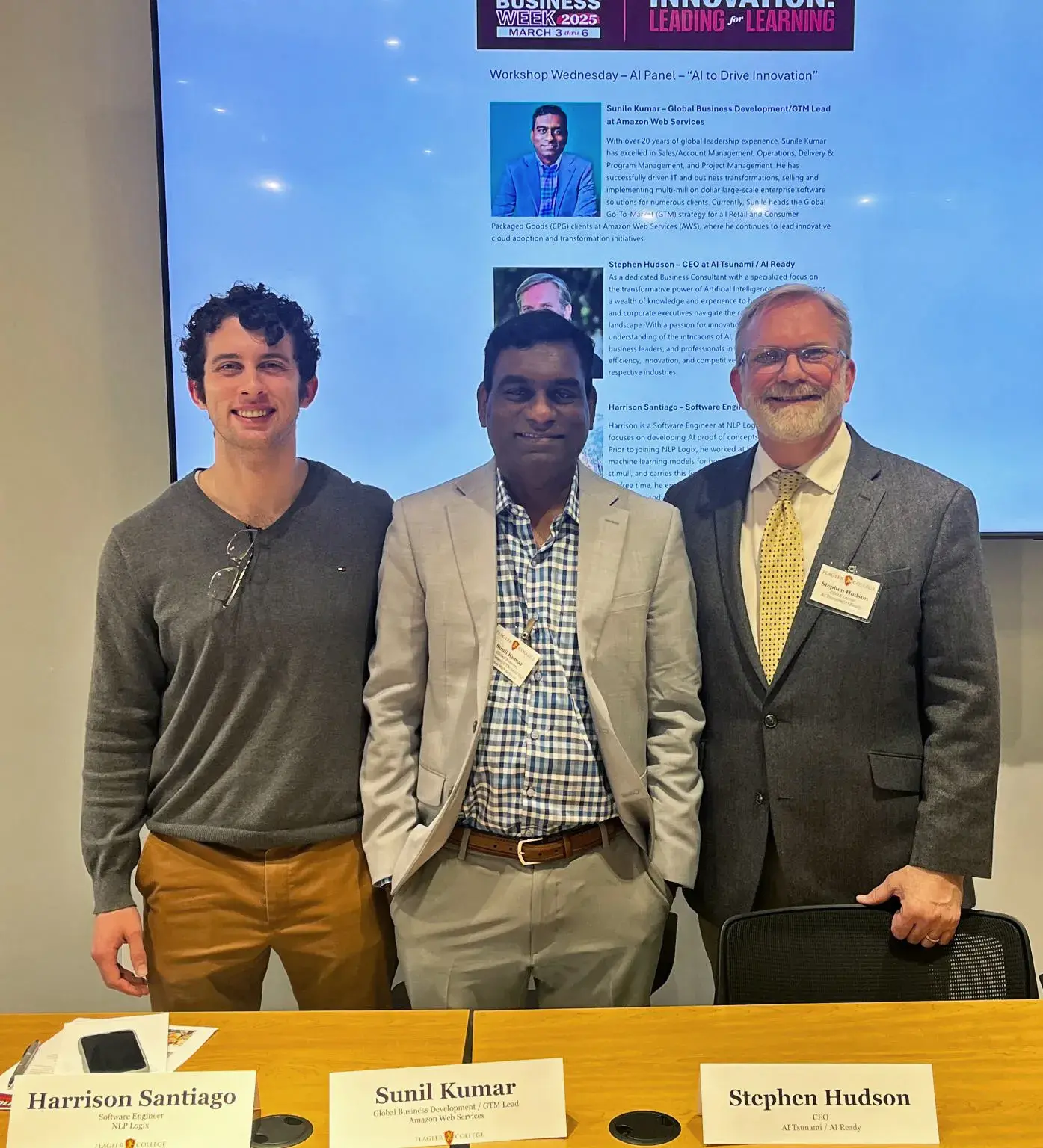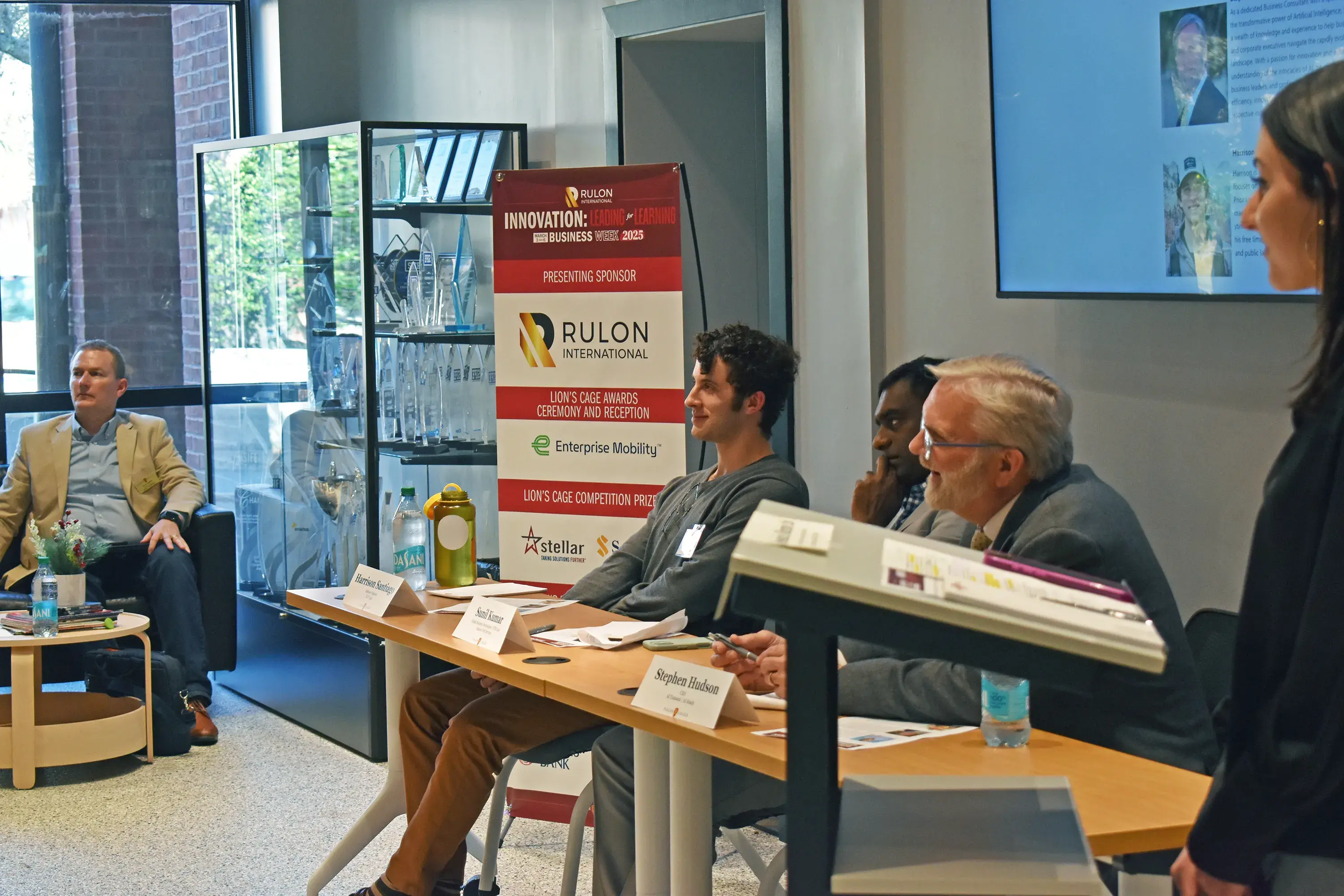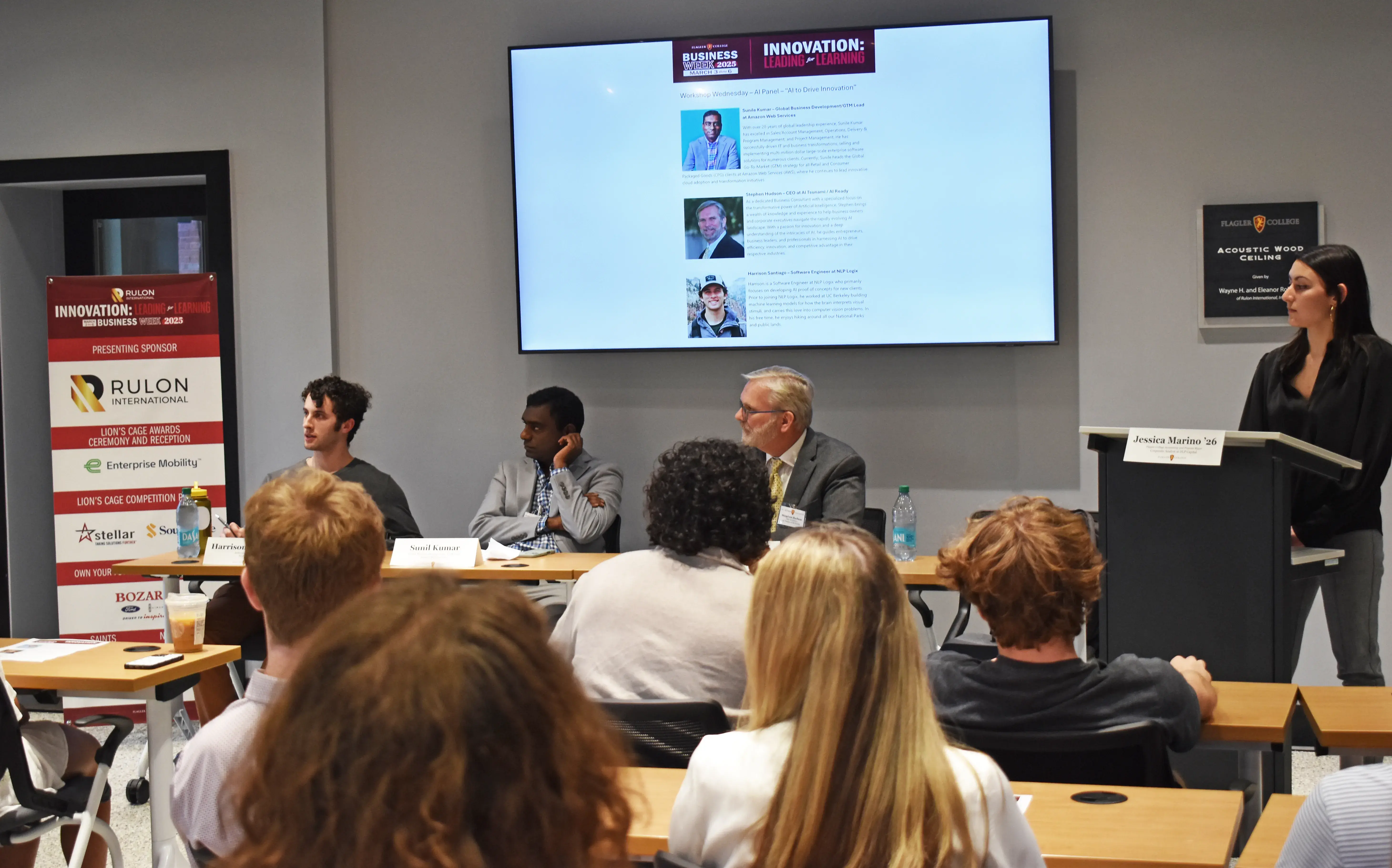
During Flagler College's Business Week last month, the “AI & Your Careers” panel featured three industry experts discussing AI's impact on the business world and its practical applications for professionals:

- Harrison Santiago | Software Engineer at NLP Logix
- Sunil Kumar | Global Business Development & Go-to-Market Lead at Amazon Web Services
- Stephen Hudson | CEO of AI Tsunami
Each panelist shared their real-world AI experiences, offering unique perspectives that enriched the discussion and sparked thought-provoking conversations.

Some background on myself: My interest in AI began with ChatGPT's release, and I've been working with it ever since. Alongside my studies at Flagler, I work as an AI consultant with clients ranging from private equity firms to education companies and bridal shops. I won the 2024 Flagler Lion’s Cage competition with "Suits.ai," an AI chatbot designed to simplify complex contracts and democratize the contract process for everyday people.
AI in the modern era
When we talk about “AI,” it’s crucial to distinguish between traditional AI and the newer wave of generative AI that’s taken the public by storm.
“We need to make a distinction between the two,” Stephen Hudson said. “[Traditional] AI and machine learning have been around since the 50s [while] generative AI has only been around since [OpenAI’s GPT-3 model launched in 2020, GPT-4 in 2023].”
The internet revolutionized information access, and two decades later, generative AI has further empowered individuals to expand their knowledge and productivity.
We’ve been inundated with claims about how AI will streamline our lives, work, and education. Amid this rapid technological change, the reality is clear, and it involves a reckoning: If you’re not utilizing AI individually or in the workplace, you’re being left behind—or, at the very least, leaving a huge opportunity on the table.
The panelists emphasized AI's benefits for personal and professional life, from refining resumes with ChatGPT to guiding business ideas and developing minimum viable products (MVPs).
“Even if you don’t know how to code, AI can be a tool for you to learn small things—like building a resume, preparing for interviews, or even learning how to code itself,” Sunil Kumar said. “There’s no better time to use these tools to take control of your future."
My take: Don’t be scared of AI! Historically, everyone who has been afraid of innovation and resisted it has been crushed by those who can adapt.
AI in Education
AI's role in education was another key theme. I don’t think it's a secret to anyone that students love to use ChatGPT to complete their homework. This is quite a concern for teachers and professors; they feel like students are no longer getting the most out of these assignments. I know many professors who now spend time trying to AI-proof their assignments.
If you’re an educator in that boat, I’d venture to warn against wasted time. There’s no way around a tech-savvy student with access to an AI model. But more importantly, creating an assignment that forces students to not use AI may be counterproductive to the benefit of students. In my opinion, it would be much more beneficial to teach students how to utilize AI to learn more and push further.

“Professors should be teaching students how to think—not just what to think,” Stephen Hudson said. “That’s the challenge now: helping students use AI to go deeper, spot patterns, and truly learn—not just regurgitate.”
AI is like the calculator; it didn't make math obsolete but enabled more complex equations, pushing mathematics to new heights.
When AI tools like ChatGPT make traditional assignments obsolete, it is necessary to go back to the first principle of what our education is supposed to do: to prepare students for the real world. The ability to think critically is the most important skill for students to achieve success.
Theoretically, the playing field of information access has never been more level. So, how can you stand out? How can you take that information and apply it to your situation to make a difference or advance your goals? The challenge isn’t stopping misuse—it’s helping students learn how to apply AI critically and creatively rather than just regurgitating information. The focus should be on developing analytical and problem-solving skills.
Most students are more familiar with the latest AI tools than professors, so professors should embrace AI as a collaborative tool rather than viewing it as a threat.
For example, professors can lead by example and leverage AI to provide more engaging and up-to-date course content, using real-world case studies and explicitly tailored examples instead of generic or overly broad textbook materials. AI can even help professors create more interactive lesson plans and learning experiences rather than just lecturing from outdated slides.
My take: AI should be seen as a collaborative tool in education, not a threat. Educators should focus on teaching students how to think critically and use AI to deepen their understanding and problem-solving skills, much like how calculators revolutionized math education. This also gives students an opportunity to have a highly transferrable and in-demand skill as they enter the workforce.
AI in business
AI in business was another crucial topic. The panelists underscored that organizations not using AI are falling behind, but incorporating AI doesn't require custom, expensive models.

Using AI can be as simple as leveraging pre-existing models to help write emails or optimize your calendar. Business platforms like Google Workspace and Microsoft 365 already integrate AI features into familiar apps like Gmail and Excel, enabling teams to gradually incorporate AI into their workflows without overhauling existing systems.
AI is the next frontier in business, both for internal processes and for building external, consumer-facing products and marketing.
“Think of AI as your personal executive assistant,” Hudson said. “It’s there to take 40% of the menial stuff off your plate so you can focus on what you were actually hired to do.”
One of the best internal use cases for AI is data analysis. Every business collects and utilizes data, whether it’s a restaurant tracking popular dishes or a tech company conducting market research for a new product. AI can analyze this data and draw inferences about what customers are most receptive to.
“You don’t need to learn how to code,” Hudson said. “But you do need to understand how AI integrates into the tools your company already uses—whether that’s Excel, QuickBooks, or CRM systems. That’s where the real productivity gains are.”
With a simple chatbot like ChatGPT, you can drop in an Excel file and ask it to create a one-page summary of the data, complete with visuals and graphs, to share with your team or stakeholders in minutes. AI can also write advertising copy. Provide a chatbot with your organization's background and specify campaign goals to tailor responses.
These are just a few straightforward ways to utilize AI that can drastically benefit your organization and workflows. While more complex applications can be extremely useful for the right organization, they require the necessary resources to create and effectively use the tools. Otherwise, the project could end up being a net negative.

Goldman during Panel Q&A
Consider this analogy: When trying to get a screw through a board, moving from using your hands to using a screwdriver is already a significant improvement. While an electric drill might be the best tool, it's useless if you don't know how to use it compared to what you can achieve with just a screwdriver.
This is where we, as students, have a great opportunity in front of us. If you can learn at least the basics of AI as a college student—the equivalent of using a screwdriver—you will be an asset to any organization. If you can advance to learn the “power tools” of AI and apply them effectively across situations, then you will be hard-pressed to find an organization that doesn’t want to hire you.
My take: AI is a powerful tool for businesses, from simplifying tasks to enhancing data analysis. Understanding how to integrate AI into your existing business can lead to significant productivity gains and is necessary for your business to stay competitive in the rapidly evolving market.



